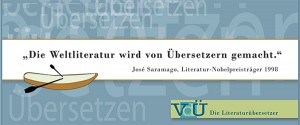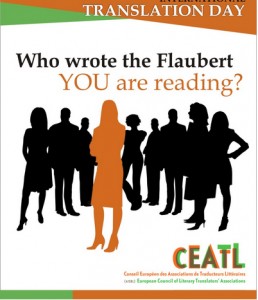On Behind-the-scenes Labor in the Cultural Economy

“Translators create universal literature.” José Saramago, Nobel Prize Winner for Literature 1998
© VdÜ (Germany’s Union of Literary Translators), design: Christian Hoffmann
Today is Giornata mondiale della traduzione, Międzynarodowy Dzień Tłumacza, Journée mondiale de la traduction, Uluslararası Çeviri Günü or Día Internacional de la Traducción—which is to say, International Translation Day, an occasion established in 1991 by the Fédération Internationale des Traducteurs (FIT: International Federation of Translators) in order to raise public awareness of the cultural impact of the wordsmith’s trade. 30 September is the anniversary of the death in 420 CE of Hieronymus, who translated the Hebrew Bible into Latin. Since ancient times translation has influenced the target language in question, and in the globally networked world of today it is our constant companion. Germany’s Union of Literary Translators (VdÜ) puts it in a nutshell: “Wherever words have been spoken, written, read, or even sung, translators have had a finger in the pie, and indeed they still do; and it is thanks to them that the whole world is at home in its own language.”

Screenshot of CEATL’s ePostcard-Action on the occasion of International Translation Day, 2012.
We usually give no more than a passing thought to the question of whose voice is speaking to us in English when we pick up a volume of Flaubert. And probably the question doesn’t even arise when we look at a website, or a work of non-fiction. For me, however, that has ceased to be the case, firstly, because I translate Italian literature and, secondly, because in my role as editor, inter alia of this museum blog, I regularly work with translators into or out of English (see Credits). Without the commitment of our various translators, neither the website of the Jewish Museum Berlin nor its other publications could appear in (almost) totally bilingual form. Whether dealing with correct equivalents for historical terms or different transcription rules for Hebrew, translation can succeed only when the translator really sets her wits to the themes addressed in a text and the specificities of our museum.
Translators who can think for themselves would surely never mistake a rope for a camel, as this video about the proverbial eye of the needle underlines. It was one of the twenty-six videos submitted to this year’s “Spot the Translator” competition, following a call for entries from the European translators’ umbrella organization CEATL. Other videos dealt with tight deadlines, which are a common problem, also for our translators; or with bad rates of pay for one of the world’s oldest professions. Of the videos shortlisted by CEATL, I found a Norwegian colleague’s entry the most impressive:
Anyone not inclined to listen to “Translators Are a Waste of Space” through to the end ought muster some patience—the apparent tirade is well worth hearing. As this video demonstrates, translators’ clever, creative approach to language really does deserve praise and appreciation. For a translator can rarely simply insert a foreign word in place of the original and leave it at that: it takes new inventions in her own tongue to do justice to an author’s puns and newly coined words. And she must also aspire to render rhyming text as rhymes in the target language, i.e., to play the poet. (See, for example, the Gaggalagu quotes in German and English.) Particular “pleasures and pitfalls” (which words fortunately echo the alliteration in the German original “Freuden und Fallstricke”) likewise await the translator of texts containing literary references, onomatopoeia, or, more especially, humor.
Given that young translators are reported to be an increasingly rare breed—see, for example, this article in German from Cologne’s daily, the Kölner Stadt-Anzeiger—I shall refrain from further comment on the difficulties and challenges posed by our behind-the-scenes endeavors in the cultural economy and finish on the most important point, namely that translation makes one happy! Michiel Moormann shares my opinion, as can be seen is his video Vertalersgeluk:
Mirjam Bitter, Media
Translated from German by Jill Denton